CCJC Audio Podcast Episode 00058, Season 2
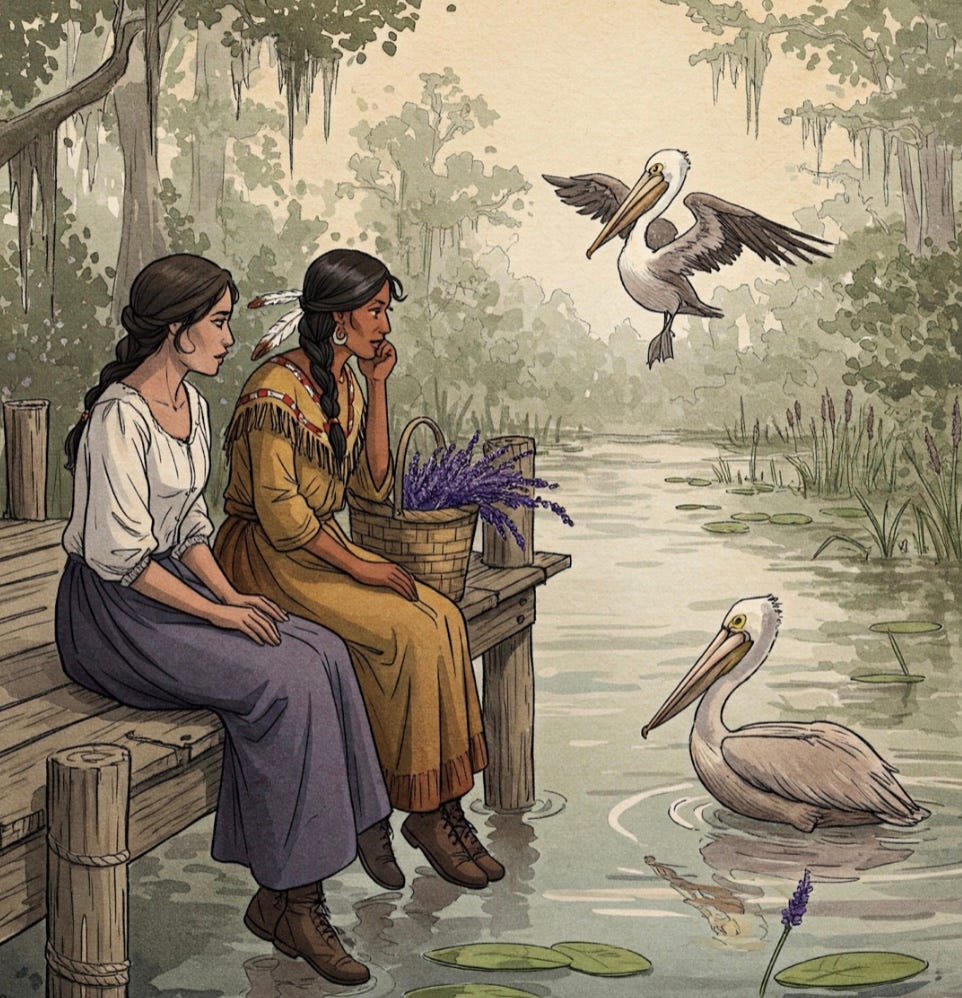
Each morning here at Cajun Chronicles Podcast Corporation we begin with a ritual of seeing who stands up first with a story to share. Doesn’t mater the topic as long as it’s a good fit for our audience. Today, was no exception, but it came from a guest who was being interviewed. It was amazing to know that many of us already had heard different versions of this tale from our own childhoods. It began with:
“We simply knew her as Christine, who Maman Hirma would go to whenever she needed a new basket. She was rumored to be a relative in part, because of the connections to one of our family surnames, “Navarro.” We lived side-by-side at the “Fork of the Chitamacha” on Bayou LaFourche. It was their land long before the ruling Spanish settled us among them in 1785.
Our own lands had been stolen from us decades before, so most of us understood with a certain unexplainable sadness, that for us to survive we had been given gifts of arpents that were stolen from them. Being unwanted in search of a fresh start, we couldn’t have survived without their guidance and kindness.
Some of our families intermarried with members of their tribe, so we became an extended family when it came to the fine art of storytelling, passing our own knowledge between cultures. Our stories often mirrored theirs and became absorbed as our own too.
Christine, who would become a revered and treasured Chitimacha elder in her own right later, often traded baskets for flowers grown by Maman Hirma. They were friends as young women. One of her stories about Brown Pelicans still rings true today. Neither of them could have ever imagined that Brown Pelicans would become Louisiana’s state bird in 1966.”
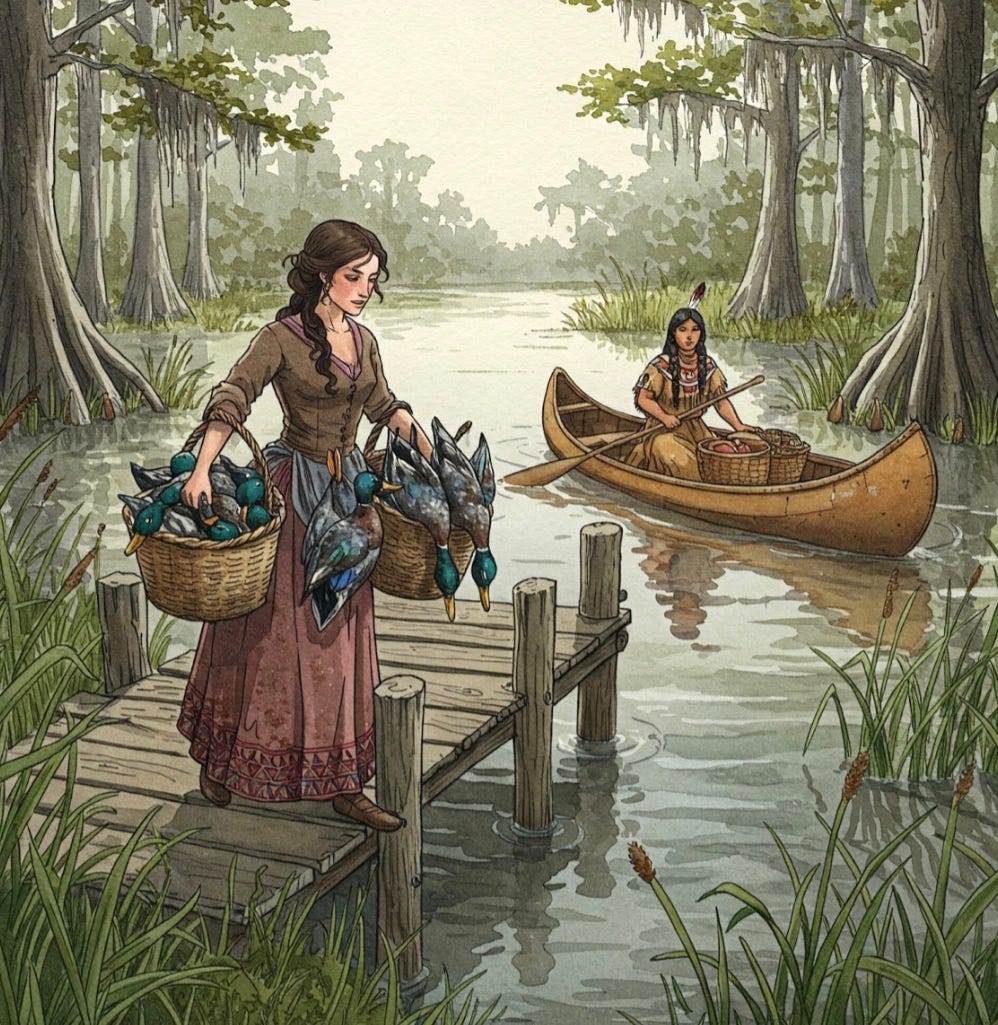
Christine’s - Brown Pelican Le Filet 'Attrape-Tout'
I’d wanted to bake some Blue-Winged Teal Ducks for a special meal and needed some fish also, so I went to Hirma’s cabin near Chacahoula on the banks of Bayou LaFourche. I’d heard her husband had gotten too much and she’d been wanting a new basket. Upon coming up to their dock, I was also hoping the lavender cuttings she’d started for me were ready to take home.
I found her sitting there watching a Brown Pelican, as if she knew I was arriving. Joining her, as the mist of the morning rose from the Bayou waters as they always do when it’s hot, I looked into the future with much sadness. I told her: “Someday when we are both long gone, they could vanish and it will be our fault. We need to teach our children and their children about them.”
“Those Brown Pelicans, they’re characters, let me tell you. Imagine, a big bird that thinks it’s one of those torpedoes Robert Fulton has been experimenting with. They dive headfirst into the muddy bayou water, like they’re trying to win a “Tomber comme une crêpe, ventre à plat” (fall-like-a-pancake belly flop) contest.”
Watch, as at first we hear a slow low rushing woosh as it gathers up speed dives head-first into the Bayou Lafourche. It’s not gentle like a falling leaf. Did you hear the woosh getting louder and becoming a sharp urgent whistle? Then that violent KER-PLASH! That thunderous, wet explosion as its pouch hit the water, throwing up a spray of stagnant droplets that caught the morning sun.
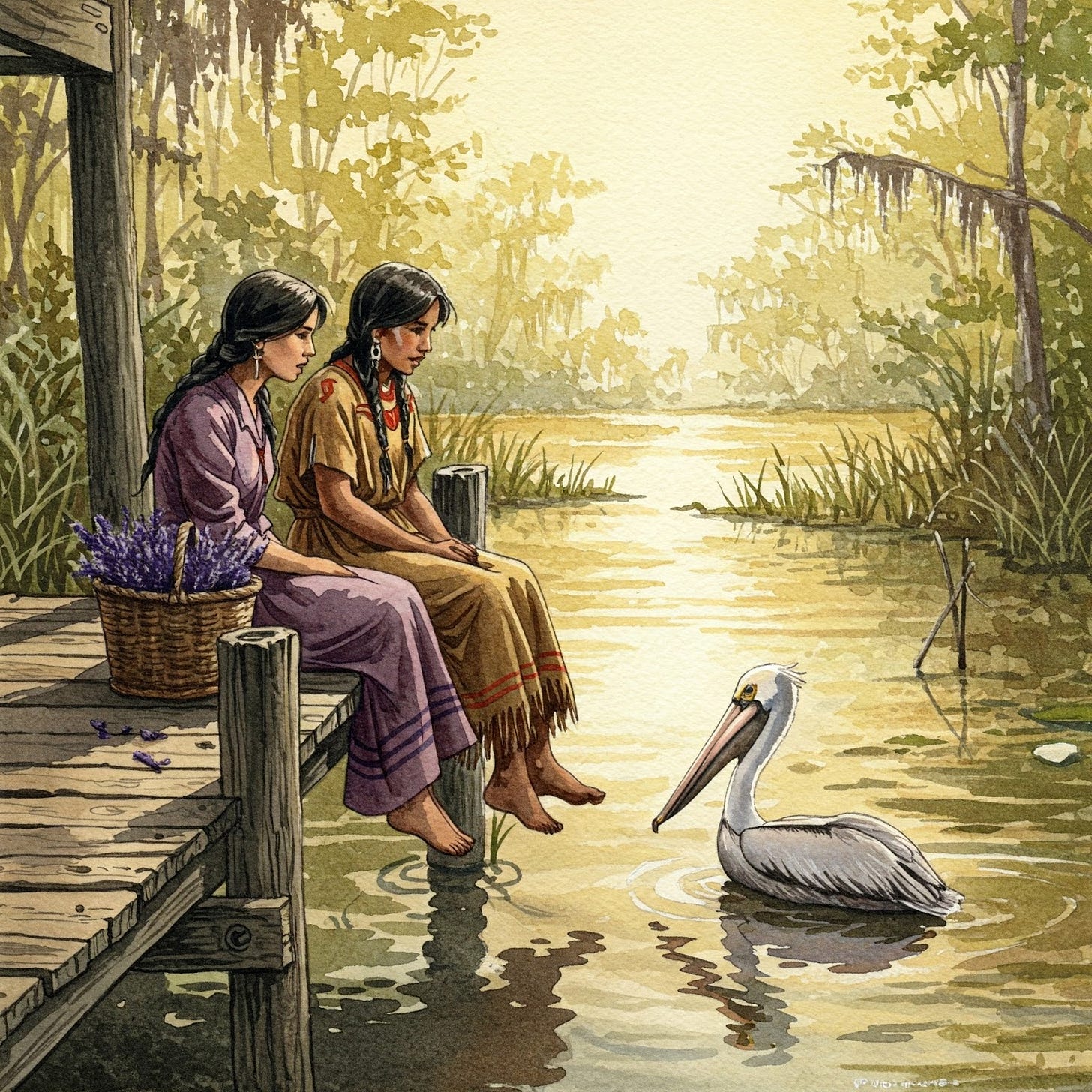
What about the sound of a thick, heavy, guttural THWUMP followed by the immediate, chaotic gagging gurgle of churning water. Did you notice within that gurgle are smaller sounds. The frantic flapping of trapped fish, the sloshing of gallons of water filling the pelican’s expandable pouch. Followed by a low, almost imperceptible creak as the pelican’s beak strains under the sudden weight.
Did you notice for a paused moment, the pelican’s head was still submerged, with a churning in the otherwise calm water? Or the powerful upward thrust as it re-emerges. The gurgling subsides, replaced by a wet drawn-out sigh of a slurp as the pelican contracts its pouch, expelling the excess water.
For in that brief, suspended moment, the pelican's head is submerged, a dark, churning vortex in the otherwise calm water. Then, with a powerful upward thrust, it re-emerges. The gurgling subsides, replaced by a wet, drawn-out slurp as the pelican contracts its pouch, expelling the excess water. A few stray droplets drip from its beak, punctuating the silence that follows.
To keep from becoming a feathery crêpe, they’ve got these big built-in clouds! It’s like they are wearing invisible cork life jackets. They’re basically flying fishing nets with a built in drain. And that big pouch? Thanks to it, they can scoop up gallons of water, then strain it out, leaving only the tasty fish. Smart, but a little messy.
But I see a dark cloud when our descendants will introduce a fancy poison potion. They will have this stuff called DDT. But instead of seeing its danger, they will convince themselves it’s a miracle. They will spray it everywhere, like it was my beloved Gulf Hairawn Muhly Sweetgrass I used for the baskets I brought you today. Little will they know, it is a horrible poison.
Our Brown Pelicans, they will eat the fish, the fish will eat the bugs, and the bugs will be covered with that DDT. That weed killer nasty stuff, it will make the pelican’s eggs so thin, they’d crack like a dry crawfish shell. Mothers would sit on their eggs warming them with their feet, trying to keep them warm, and opps! Crunch. No baby pelicans. It will be a sad, sad time.
It will almost be a swampy bird ghost story! There will be silence where there once was the miraculous sounds of pelicans diving and squawking, a tragic and ironic terrible thing. Briefly the clouds of darkness will part. And like the strong roots of our Bald Cypress trees, our people, yours, and other cultures will band together.
The good hearted people from all over, will not give up. We’ll say, “No more DDT!” We will work together to clean the mess. We will even buy pelicans from elsewhere to help them return. And you know what? It will work (at least for a while). Those crazy, diving, pouch-mouthed birds will come back, stronger than ever.
So what’s the lesson here for our children and theirs? We must respect the balance of nature. Those chemicals, those shortcuts, can have terrible consequences. We must heed the wisdom of our ancestors. We must protect the creatures that share our home. Because if we don't, who will? A Louisiana without Brown Pelicans? That would be like a Holy Trinity spices without the celery! Unthinkable!
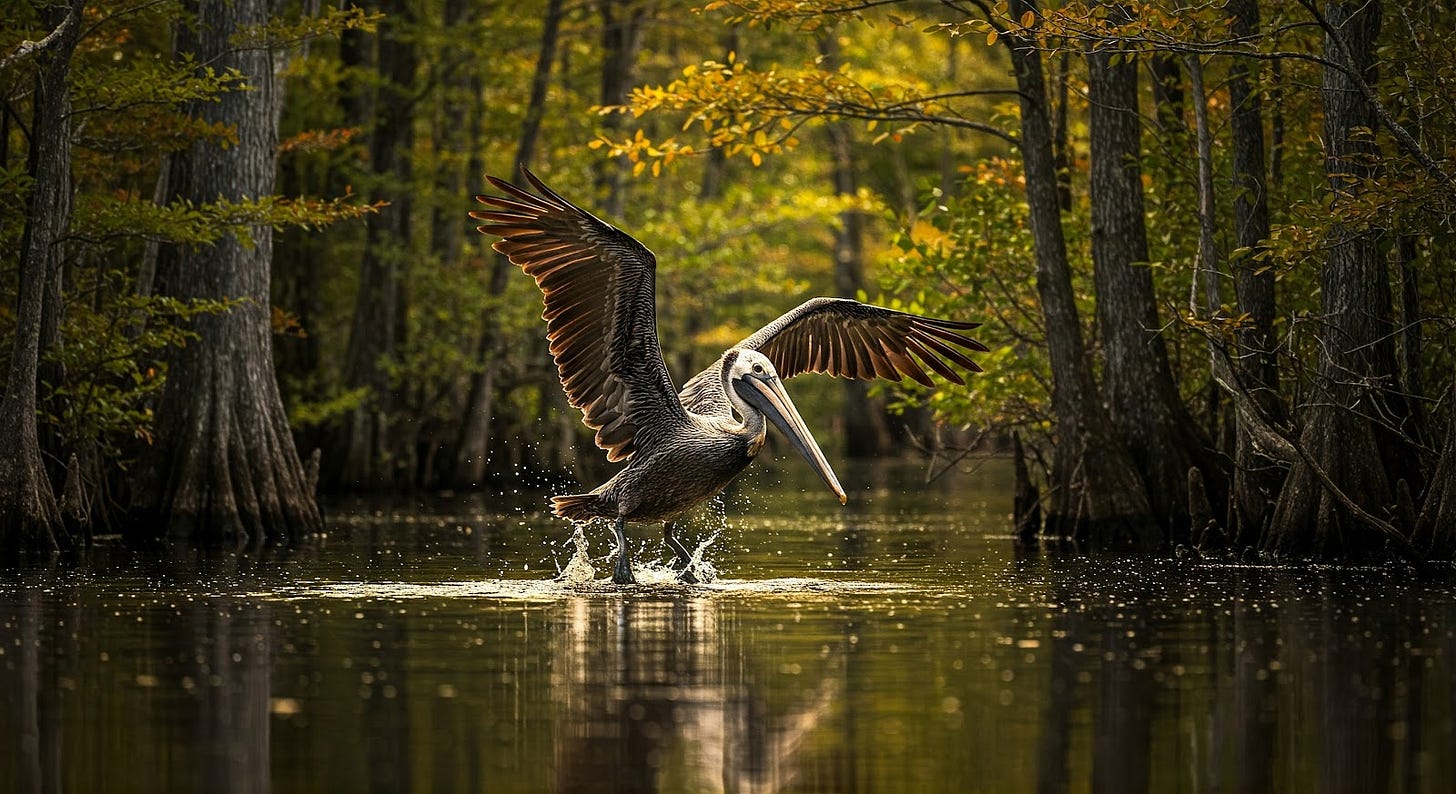
Brown Pelican Truths That Might Seem Like Fiction But Aren’t
Mais oui! You see those Brown Pelicans, they aren’t just big goofy birds. They’re like flying submarines. They dive from higher than your Granpere’s barn roof, sixty-five feet! Ker-plouf! Just to keep from becoming a feathery pancake, they have built in air cushions, like today’s fancy car airbags, ‘cept natural!
You know those smart birds, they know when turning life, they must keep their neck safe, like a good driver looking before turning. That pouch? It isn’t a pelican grocery bag! It holds three gallons! That’s more than your Maman’s biggest cook pot can hold! They scoop up the fish, drain the water,n slurp, just like that! Those pelicans, they know how to eat.
They have funny ways. Instead of sitting on their eggs like a proper chicken, they use their great big webbed feet! Like they’re wearing warm socks all the time! It was a sad time when that DDT nasty stuff made their eggs crack like dry crawfish shells back in 1966. They were nearly extinct.
Those wonderful birds have been around for millions of years, like those old growth Bald Cypress trees in the Lafourche, hardly changing a bit. Brown Pelicans, they’re true Louisiana survivors, Mais Yeah!
Our tales are inspired by real Louisiana and New Orleans history, but some details may have been spiced up for a good story. While we've respected the truth, a bit of creative license could have been used. Please note that all characters may be based on real people, but their identities in some cases have been Avatar masked for privacy. Others are fictional characters with connections to Louisiana.
A Word of Wisdom:
As you read, remember history and real life is a complex mix of joy, sorrow, triumph, and tragedy. While we may have (or not) added a bit of fiction, the core message remains: the human spirit's power to endure, adapt, and overcome.
© Jerilee Wei 2025 All Rights Reserved.




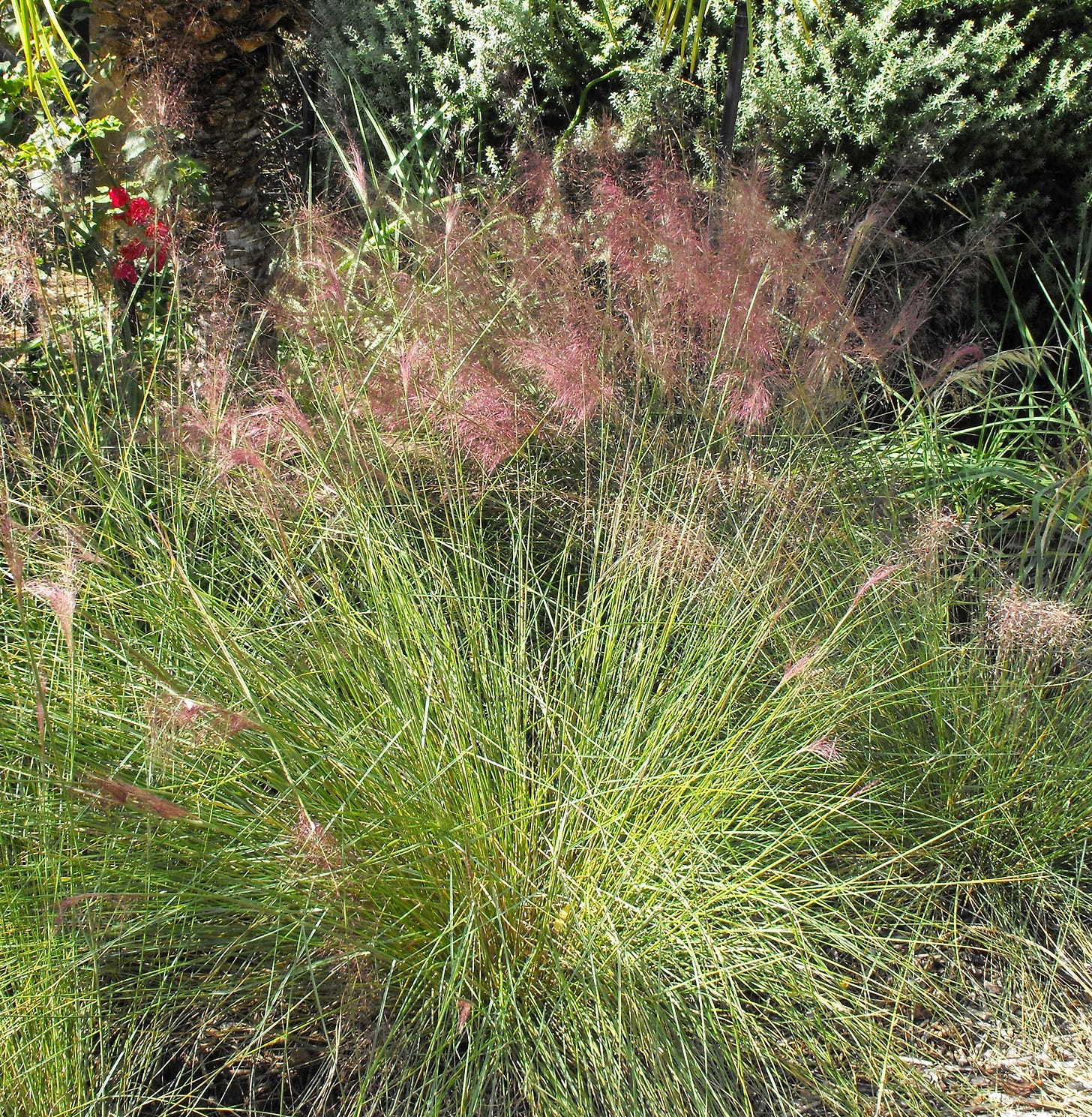



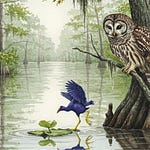






Share this post